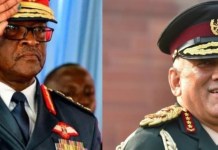To further strengthen India-Bhutan Relations, the newly-elected third Prime Minister of Bhutan, Lotay Tshering is expected to visit India on 27 December, as per a recent media report. India has accelerated its approach towards smaller south nations neighbours like Bhutan, Nepal, the Maldives where China has been aggressively trying to woo the governments with extensive loans and restrict Indian influence. A EurAsian Times analysis
India-Bhutan Relations
Nt many people are aware of India-Bhutan treaty which authorised Indian soldiers to intervene in Doklam to check transgression of the existing arrangements between the three countries about their border disputes, and resolution of the disputed tri-junction points.
China Enticing Bhutan, The Last Standing Indian Ally to Join OBOR Project
Earlier, China’s official media wrote that that “China-Bhutan border dispute had nothing to do with India as a third party and it had no right to intervene in or deter the boundary talks between China and Bhutan, still less to make territorial claims on behalf of Bhutan. China has all along respected Bhutan’s sovereignty and independence.’’
China and Bhutan have engaged in 24 rounds of border talks – three more than India and China, with the sticking point being the Doklam joining India, China and Bhutan.
For long, Beijing has offered Bhutan a swap deal which it has rejected. Doklam’s geostrategic importance coupled with the location of the disputed tri-junction in the Chumbi Valley has twisted the India-China and China-Bhutan border disputes. Any de-coupling will have an adverse impact on the security of India and Bhutan.
Initially, India-Bhutan relations were governed by the 1949 Treaty of Perpetual Peace and Friendship. Despite unofficial Indian claims that Bhutan had agreed to be guided by India in its defence and foreign affairs for enjoying full autonomy in internal administration, the treaty did not include defence, but only external relations.
- Indian Military Base in Sabang can Strangle China at the Strait of Malacca
- War Over Water – Pakistan Concerned by India, Afghanistan Threats
In the renegotiated Treaty of 2007 – before the transformation of Bhutan from absolute monarchy to constitutional monarchy – even the guidance by India in Bhutan’s external relations was deleted and replaced with ‘both countries will cooperate closely on issues relating to national interest including neither country allowing use for its territory for activities harmful to national security and interests of the other’.
This treaty was the reason why the Indian troops moved to Doklam and block the belligerent Chinese forces from constructing roads to Jampheri Ridge overlooking the Siliguri corridor and finally to the disputed tri-junction.
The Chinese Army (PLA) has strengthened and fortified its disposition tremendously in Doklam following the withdrawal agreement on 28 August 2017. It tried to blacktop another road but was stopped, though a number of helipads and smaller tracks have been built in North Doklam without technically violating the terms of disengagement.
The Doklam parliamentary panel report by its chairman Shashi Tharoor has signalled the Chinese build-up. India too has improved its defences including constructing a blacktop road to Doka La post. For now, all’s quiet on the Doklam front, with commanders from both sides meeting every day.
The new PM Tshering said there will be no change in Bhutan’s policy towards India. King Jigme Singhye Wangchuck (K4) was most explicit in embracing India saying, “I have put all my eggs in India’s basket”. His father, K3 had said, “friendship with India is the cornerstone of Bhutan’s foreign policy.” The present king, Jigme Khesar Namgyal Wangchuck (K5) has said, “India is a most special friend and Bhutan will cooperate in the field of security with India”.
Trust & Goodwill Between India and Bhutan
16 months after Doklam, Bhutan has solidified its policy on Doklam and in dealing with China. India’s prompt intervention based on the 2007 Treaty has jammed China’s strategy in altering the status quo in Chumbi valley. Thimphu’s complete support of Delhi’s aggressiveness to thwart China has reaffirmed mutual faith in the treaty arrangements.
Indian Military Base in Sabang, Indonesia can Strangle China at the Strait of Malacca
Beijing’s continued efforts in dividing China-Bhutan border dispute from the India-China border dispute have failed. In July this year, Chinese Vice Foreign Minister, Kong Xuanyou made a rare three-day visit to Thimphu making it the highest level contact after Doklam.
China has no diplomatic relations with Bhutan. In Thimphu, Kuwait, Bangladesh and India are the only three countries with embassies in Bhutan. After Bhutan became a member of the UN in 1971, it became the first country to recognise Bangladesh. From India’s standpoint, Doklam incident has clearly signalled to China how far Delhi is prepared to go to fulfil the treaty obligations to Bhutan.
The EurAsian Times is an English Language Digital News-Site, which specializes in reporting News and Editorials on South Asia, Asia Pacific, Middle East, and the Eurasian Region. EurAsian Times has a strong editorial presence in New Delhi, Dubai, Karachi, and Toronto and have expertise in penning editorials on Defence, Politics, Health, Education and International Relations. A team of highly trained journalists, activists, freelancers and artists contribute to the EurAsian Times, apart from the coverage by its staff writers. The views of the writer may not necessarily reflect the view of EurAsian Times
Other News at EurAsian Times





